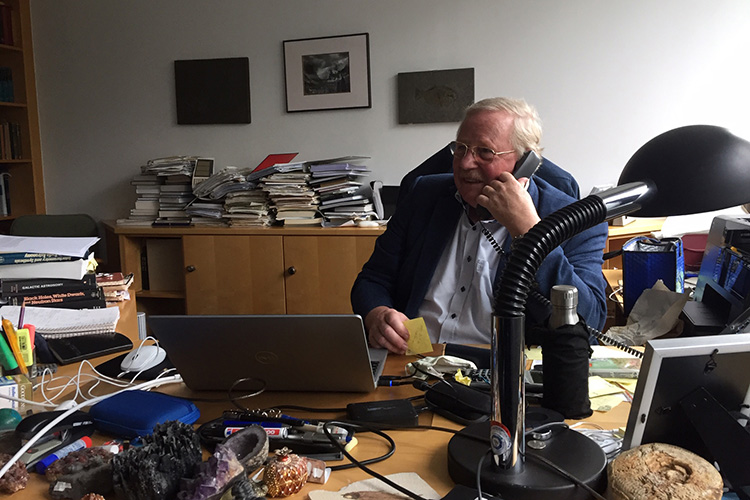UC Berkeley’s Reinhard Genzel awarded Nobel Prize in Physics

Reinhard Genzel, a professor emeritus of physics and of astronomy at the University of California, Berkeley, and director of the Max Planck Institute for Extraterrestrial Physics in Garching, Germany, will share half the 2020 Nobel Prize in Physics with UCLA professor Andrea Ghez “for the discovery of a supermassive compact object at the center of our galaxy.”
The other half of the prize goes to United Kingdom theoretical physicist Roger Penrose “for the discovery that black hole formation is a robust prediction of the general theory of relativity.”
The announcement today in Stockholm, Sweden, is for work concerning one of the most bizarre predictions of the general theory of relativity espoused by Albert Einstein more than 100 years ago — that if an object were massive enough, its gravity would be so strong that nothing, not even light, could escape. In 1965, Penrose proved that black holes really can form and described them in detail, showing that, at their heart, they hide a singularity in which all the known laws of nature cease.
In 1969, Donald Lynden-Bell and Martin Rees suggested that the Milky Way galaxy might contain a supermassive black hole at its center, but evidence was lacking because the galactic core is obscured by interstellar dust and could only be detected as a relatively faint radio source, called Sagittarius A*.
At the time, Genzel was a postdoctoral fellow at UC Berkeley working with the late Nobel laureate Charles Townes. The two presented the first observations hinting that the center of our galaxy harbored a massive black hole, though the evidence was weak. Genzel worked steadfastly over the ensuing decades to prove his case.
He developed a “remarkable technique in which he can measure very accurately and determine quite precisely the mass and behavior of stars circulating around the galactic center,” Townes said in 2008. Genzel and his collaborators developed this technique to use with telescopes of the European Southern Observatory, and for many years, Genzel’s team carried out a program of observing the galactic center and its surrounding stars.
He and his colleagues cemented their assertions in 2002, when they reported the orbit of a star around the galactic center and concluded that it circled an object with the mass of several million stars like our sun, all tightly packed into a region less than the size of our solar system.
Ghez led a competing team at UCLA that confirmed this finding. As both groups mapped the galactic center with increasing precision using the world’s largest telescopes, they provided the most convincing evidence yet of a supermassive black hole at the center of the Milky Way, an extremely heavy, invisible object about 4 million times the mass of our sun.
“Using cutting edge instruments on the largest optical and infrared telescopes, Genzel and Ghez have for years provided the best — and ever mounting — evidence for the existence of a supermassive black hole,” said Chung-Pei Ma, a UC Berkeley professor of astronomy and of physics who studies supermassive black holes in distant galaxies. “As they painstakingly added another decimal point to the value of the mass for Sgr A* at the center of our own galaxy, their conclusion that Sgr A* is a black hole became increasingly inescapable. This is a beautiful example of what perseverance, curiosity and technology can come together to achieve.”
“Berkeley congratulates Reinhard Genzel on his Nobel Prize,” said UC Berkeley Chancellor Carol Christ. “It is particularly moving that he began his Nobel work as a postdoctoral fellow with another Nobelist, Charles Townes, advancing extraordinary work at Berkeley on the mysteries of the cosmos.”
“The discoveries of this year’s laureates have broken new ground in the study of compact and supermassive objects. But these exotic objects still pose many questions that beg for answers and motivate future research — not only questions about their inner structure, but also questions about how to test our theory of gravity under the extreme conditions in the immediate vicinity of a black hole,” said David Haviland, chair of the Nobel Committee for Physics, in a news conference in Sweden to announce the prize.
With Genzel, UC Berkeley is now home to nine Nobel laureates. Overall, 24 faculty members have received the Nobel Prize.
